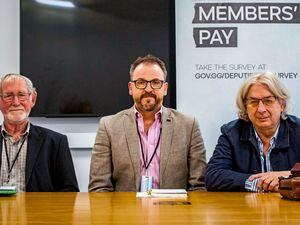ED: plug the brain drain with immigration reform
OPENING the door to more immigration could ensure Guernsey’s working population is at ‘sustainable levels’ and attract the ‘right’ people to boost the economy.

The States’ Economic Development committee said that the current regime could be ‘liberalised further’ in the face of an ageing population and ‘natural limits’ to increasing workforce participation rates.
The possibility of reform came as the Guernsey branch of the Institute of Directors said that planned and targeted immigration had a role to play in addressing the decline of Guernsey’s economically active residents and the impact of the island’s ‘brain drain’.
Economic Development said that the States had acknowledged that ‘there will always be a need to import key skills and labour in order to grow the economy, stabilise public finances and sustain our quality of life’.
It was also accepted that this was in addition to developing and maintaining the island’s workforce at a size and make-up consistent with achieving the States’ strategic economic, social and environmental objectives.
‘This work directly supports the Policy & Resource Plan’s strategic outcome of being a centre of excellence and innovation as well as securing a strong, sustainable and growing economy,’ said the committee’s economic development strategy policy letter that will be debated by the States.
‘Consequently, the committee’s view is that to enable more people to relocate to Guernsey for employment purposes would be consistent with the existing strategic population policy.
‘The committee’s view is that the regime could be liberalised further.
‘The demographic challenge in relation to the proportion of the population that is economic active means it will be necessary to ensure the size of the working population remains at sustainable levels.
‘In addition, we need to continue to attract the right demographic of people to Guernsey to support and grow the economy, as their skills and businesses will become more important, as well as supporting existing employers in sectors such as tourism and hospitality.’
The document also highlighted how continuation of low levels of net emigration from Guernsey was placing a downward pressure on the working age population.
This had been balanced by increasing levels of workforce participation in almost every age group.
However, it added: ‘In the long term, workforce participation rates have natural limits and are unlikely to be able to compensate for the fall in the working population’.
Guernsey IoD chairman John Clacy said: ‘The issue of economically-active residents is never far from any discussion concerning the capacity and capability of the island. The decline in economically-active residents will start to bite in the near future, with the number of taxpayers falling whilst the pressure of healthcare and pensions continues to increase.’
Consideration needed to be given as to how a shrinking tax base could pay for the needs of the retiring generation as well as funding high-quality education, infrastructure, transport links, social welfare, housing and other services that islanders wanted.
‘At present, and unless something is done to increase the number of economically active residents, the future looks very challenging,’ added Mr Clacy.
‘It is the IoD’s view that Guernsey benefits from the temporary and permanent entry of citizens from other countries as visitors, skilled workers, students and migrants.
‘Accordingly, the primary focus of Guernsey’s population should be on encouraging immigration to the island of people who bring with them entrepreneurial skills and a capacity to add diversity to the Guernsey business environment and second, people who have the skills and experience that help meet the current and future needs of business and industry.
‘In short, the IoD believes that immigration has a role to play in both addressing the decline of Guernsey’s economically active residents, and the impact of the island’s “brain drain”, provided it is planned, focussed and targeted to help meet the identified needs of business and the community.’





